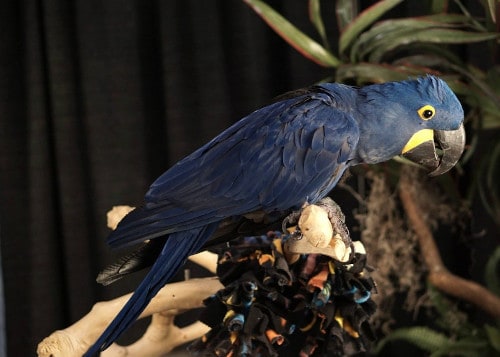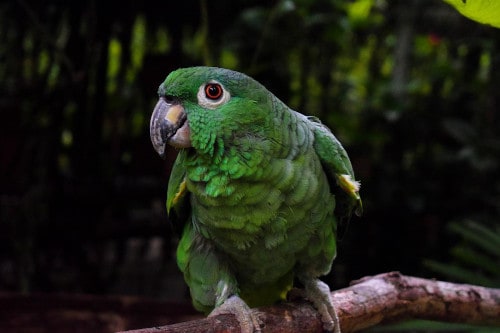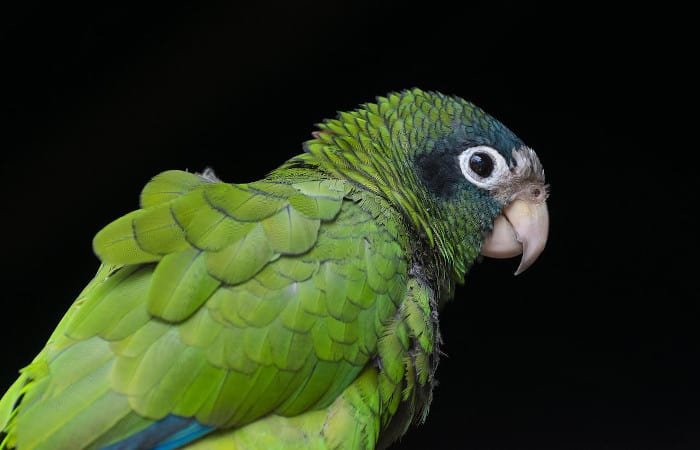Do you know if parrots can see in the dark?
This is a question that many people have, and it is actually a pretty interesting topic.
In this blog post, we will explore whether or not parrots can see in the dark.
We will also discuss some of the other abilities that parrots have when it comes to seeing things.
Stay tuned for more information on this topic.
Can parrots see in the dark?
If you’ve ever tried to sneak up on a parrot, you know that they’re very good at spotting movement, even in low light.
But does that mean that they can see in the dark?
The answer is a little complicated.
While parrots do have good vision during the day, they don’t see as well at night.
That’s because their eyes contain fewer rods and more cones, which are the light-sensing photoreceptors on the retina.
Rods are better at detecting movement and shapes in dim lighting, while cones are better at seeing color and detail.
As a result, parrots have poor vision at night, but they make up for it during the day with their bright plumage and sharp eyesight.
How does a parrot’s vision differ from a human’s?
Parrots have unusual eyesight that differs significantly from that of humans.
First, parrots have extremely good peripheral vision, allowing them to see over 300 degrees.
This gives them an enormous advantage when it comes to spotting predators or other threats.
Additionally, parrots have better depth perception than humans, which helps them navigate through their environment more effectively.
Finally, while humans can only see 3 primary colors, parrots are tetrachromats, and they see 4 primary colors which include UV, blue, green, and red.
All of these factors combine to make parrots one of the most visually sophisticated creatures on the planet.
You may also like: 7 Common Budgie Sleeping Positions and Their Meanings
Are parrots scared of the dark?
While most parrots are active during the day, some species are nocturnal and actively hunt at night.
Night parrots and Kakapos are the only two nocturnal parrot species in the world.
Additionally, many parrots roost in trees and may not feel comfortable descending to their nests in the dark.
However, there is no evidence that parrots are truly afraid of the dark.
In fact, some parrots seem to enjoy playing in dimly lit rooms or under black light.
If your parrot seems nervous in the dark, it is likely due to a lack of familiar items or fear of predators.
By providing your parrot with a few safe toys and a hiding place in the cage, you can help them feel more comfortable in the darkness.
You may also like: Do Parrots Sleep With Their Eyes Open? The Surprising Answer
What should you do if your parrot is scared of the dark?
It can be really upsetting to see your parrot scared of the dark, especially if it has never seemed afraid of darkness before.
There are a few things you can do to help your parrot feel more comfortable in the dark:
First, make sure your parrot has a safe place to perch in its cage or aviary.
A perch near the top of the cage will give your parrot a sense of security.
Second, provide your parrot with some toys or objects that are specifically for nighttime play.
For example, you might want to get a set of glow-in-the-dark balls for your parrot to play with.
Third, if possible, try to gradually acclimate your parrot to darkness by turning off the lights in its room for short periods of time each day.
Start with just a few minutes of darkness, and gradually increase the amount of time as your parrot becomes more comfortable.
With a little patience and understanding, you should be able to help your parrot overcome its fear of the dark.
Do parrots need darkness to sleep?

Parrots are one of the most popular pets in the world and for good reason.
These colorful birds are known for their intelligence and ability to mimic human speech.
However, potential parrot owners should be aware that these birds have special needs when it comes to sleep.
Unlike other birds, parrots do not require complete darkness to sleep.
In fact, they are often more comfortable sleeping in a dimly lit room.
This is because parrots are most active during the hours of dawn and dusk when light levels are low.
As a result, they typically feel more relaxed in a subdued environment.
So if you’re thinking of adding a parrot to your family, be sure to provide a safe and comfortable space for your new feathered friend to rest.
You may also like: Why Is My Budgie Sleeping So Much? Should I Be Worried
Should you cover your parrot cage at night?

Parrots are diurnal creatures, meaning they are active during the day and sleep at night.
In the wild, they roost in trees, often in large flocks, and their natural sleep cycles are regulated by the rise and fall of the sun.
In captivity, however, parrots often sleep in small cages that offer little protection from the outside world.
For this reason, many bird experts recommend covering the cage at night to create a sense of privacy and safety for your parrot.
A dark, quiet environment will cue your parrot’s body to produce melatonin, a hormone that promotes sleep.
Additionally, covering the cage can help to reduce noise levels and prevent your parrot from being disturbed by unexpected noises or bright lights.
By creating a peaceful environment at night, you can help your parrot get the restful sleep it needs to stay healthy and happy.
You may also like: Can Cockatiels Sleep With Noise? Everything You Need To Know!
Tips to avoid disturbing parrots in the dark
Many people are fascinated by parrots, and these brightly colored birds can make excellent pets.
However, parrots are also very sensitive creatures, and they need a peaceful environment in order to thrive.
One of the most important things to remember when keeping a parrot is to avoid disturbing them during the night.
Disturbing parrots in the dark can have negative consequences for both the bird and the disturber. Here are some tips to avoid doing so:
1) Avoid making any sudden noise that can cause great distress to parrots.
2) Avoid using flashlights or other bright lights near parrots, as this can startle them.
3) If you must go near a parrot’s nest, be sure to approach quietly and slowly.
4) Respect the space of nesting parrots, and never enter an area that is marked as off-limits.
By following these tips, you can help to avoid disturbing parrots in the dark and ensure their safety.
Conclusion
Can parrots see in the dark?
The answer is yes, but they don’t see as well as they do in the light.
Parrots need darkness to sleep and should be covered at night.
Remember to avoid disturbing parrots in the dark by making sudden noises or using bright lights.
By following these tips, you can help your parrot feel safe and comfortable in the dark.
